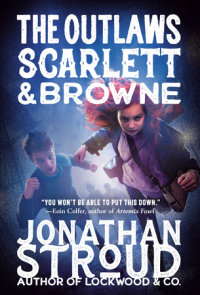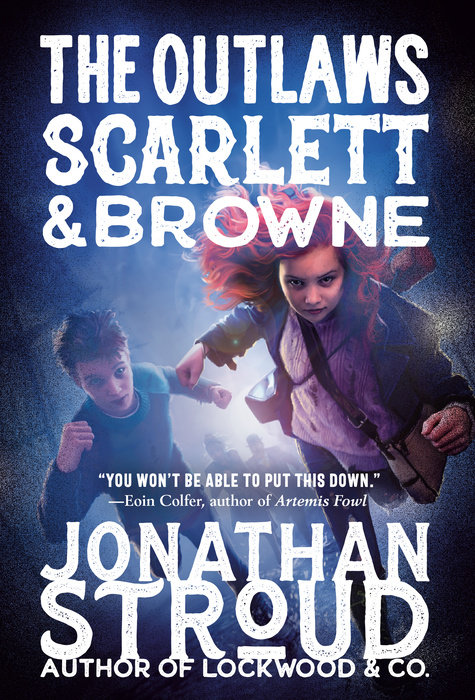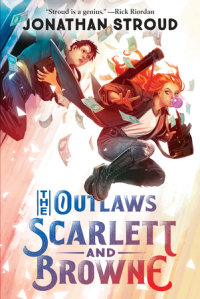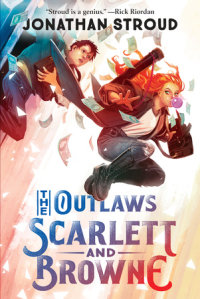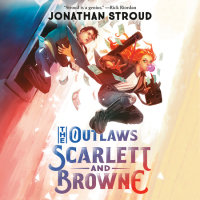The Outlaws Scarlett and Browne
The Outlaws Scarlett and Browne is a part of the Scarlett and Browne collection.
Action! Humor! Fantasy! "Kicking off a new series with a bang (several bangs, in fact), Stroud sends two young fugitives with murky pasts fleeing murderous pursuers across a fractured future Britain." —Kirkus Reviews, starred
Scarlett McCain is a shoot-first ask-questions-later kind of outlaw. She scrapes by on bank heists, her wits—and never looking back.
She’s on the run from her latest crime when she comes across Albert Browne. He is the sole survivor of a horrific accident, and against her better judgement, Scarlett agrees to guide him to safety.
This is a mistake. Soon there are men with dogs and guns and explosives hot on their heels. Scarlett’s used to being chased by the law, but this is extreme. It was only a little bank she’d robbed . . .
As they flee together across the wilds, fighting off monstrous beasts, and dodging their pursuers, Scarlett comes to realize that Albert Browne is hiding a terrible secret. And that he may be the most dangerous threat of all.
In this fast-paced, quick-witted whirlwind of a story, Jonathan Stroud introduces two unlikely allies—the outlaws Scarlett and Browne—who are about to become the most notorious renegades in all that’s left of Britain.
An Excerpt fromThe Outlaws Scarlett and Browne
1
That morning, with the dawn hanging wet and pale over the marshes, Scarlett McCain woke up beside four dead men. Four! She hadn’t realized it had been so many. No wonder she felt stiff.
She tipped her prayer mat from its tube and unrolled it on the ground. Sitting cross-legged upon it, she tried to meditate. No luck, not with four corpses staring at her and a knife wound throbbing in her arm. A girl couldn’t concentrate in those conditions. What she needed was food and coffee.
She got to her feet and glared down at the nearest body. It was a portly, black-bearded Woldsman in a denim shirt and jeans. He looked old enough to be her father. Perhaps it was her father. His face, half resting on mud and stones, wore an aggrieved expression.
“Yeah, we’ve all got problems,” Scarlett said. “You try to rob me, that’s what you get.”
She stepped over the man and went down to the lake to inspect the animal snares. Yet again her luck was poor. The traps were broken, the noose strings bitten through. At the end of a smear of blood, a rabbit’s head lay tilted in the bent, wet grass. The long rust-brown ears were cocked upward as if giving her a furry two-finger salute. It was like the mud-rats had deliberately left it that way.
Scarlett McCain swore feelingly in the direction of the forest. Then she took a penny from her pocket and transferred it to the leather cuss-box hanging at her neck. Already in the red! And she hadn’t even had her breakfast.
Back at camp, she brewed coffee over the remains of the night’s fire. She drank standing up, straining the dregs through her teeth and spitting the black grit into the water of the stream. It would be a clear day; cool at first, but no rain. The hilltops of the Wolds were picked out in buttery yellow, the western flanks still dark and blue. Way off, beyond the edge of the marshes, Scarlett could see the streetlights of Cheltenham showing behind the fortifications. As she watched, they shut off the town generator and the lights winked out. In another half hour, they’d open the gates and she could go in.
She rolled up her blanket and slotted her prayer mat in its tube, then went to collect her sulfur sticks. Two had been trampled in the fight, but three were OK: the smell had kept the mud-rats off during the night. Scarlett shook her head. It was getting so you couldn’t take a kip in case one of those bristly bastards slunk out of a bush and bit your nose off. The bigger rats would do that. It had happened to people she knew.
She stooped to her rucksack, unclipped the two empty bottles, and carried them to the stream. One of the men she’d killed was lying half in the water, faceup, blond hair swirling with the riverweed, a white hand floating above the pebbles like a crimped and curling starfish. Scarlett went upstream of the obstruction. She didn’t want to catch anything.
Her leather coat brushed against the reed stalks as she waded a few steps in and refilled the bottles. Mud and water reached halfway up her boots. She glimpsed her pale, round face hanging distorted beyond the ripples. Scarlett frowned at it, and the face frowned back at her. Its long red hair was tangled worse than the riverweed. She’d have to fix that before she went into town.
She was tightening the bottle tops when she felt the skin prickle on the back of her neck. She looked behind her, suddenly alert, her senses operating at a new intensity.
The sun was rising over the Wessex Wilds; everything was lit a fiery, optimistic gold. There was almost no breeze. Out on the lake, the motionless water clung about the reed stems, as flat and blank as glass.
Scarlett stood where she was, a bottle in each hand, trying to hollow herself out so that every available sensation came flooding in. Her eyes moved slowly round.
No danger was visible, but that didn’t fool her. Something had come out of the forest, drawn by the smell of spilled blood.
So where would it be?
A short distance from the shore, midway between the lake and the trees, the remains of ancient buildings protruded from humped grass. The melted walls were crags now, harder than rock and fused into strange black shapes. A flock of birds, coiling like a streamer, wheeled and darted high above, then swept off across the forest. She could see nothing else, nor was there any sound.
Scarlett walked back to her rucksack, fixed the bottles and tube in place, and hoisted the bag over her shoulders. She kicked soil over the fire, circling slowly so as to scan the landscape in all directions. If time had allowed, she would have rifled the bodies of the outlaws in search of supplies, but now she just wanted to get away. She made a token inspection of the bearded man; just another failed farmer who thought possessing a knife, a paunch, and a bad attitude made him capable of attacking a lone girl sitting by her campfire. The knife was not as sharp as the one Scarlett had in her belt, but he did have a greaseproof pack of sandwiches in the pocket of his jacket. So that was Scarlett’s lunch sorted.
She left the camp and began threshing her way through the tall, wet grasses. Off to the west, clouds were massing to extraordinary heights, mountains of pink and white towering over the Welsh frontier. Scarlett moved away from the lake and made directly for the crags. Better to face the creature now, out in the open with the sun at her back, than be stalked across the marshes. Hide-and-seek wasn’t her thing.
When she got within fifty yards of the walls, she stopped and waited. Presently a long, low-backed piece of darkness peeled off from the edge and loped into the sunlight. It was a brindled gray-and-black wolf, a mature adult, twice as long as Scarlett was tall. Its head was lowered, but the lazily swinging shoulder blades rose almost as high as her chest. The amber eyes were fixed upon her. It came forward unhurriedly, with the confident swagger of a salesman about to close a deal. No fuss, no flurry. It too was keen to get the job done.
Scarlett’s hand moved slowly toward her belt. Otherwise she stood where she was, a slight, slim figure in a battered brown coat, weighed down with a rucksack and tube and bottles and all the paraphernalia of a girl who walked the Wilds.
The wolf slowed its pace. When it was six yards away, it halted. It raised its head to the level of Scarlett’s, and she and the animal appraised each other. Scarlett took note of the wet fangs, the black lips, the intelligence burning in its gaze. Perhaps the wolf noted something in Scarlett McCain too. It turned its head; all at once it was trotting past her and away. Its thick sharp tang whipped against her face and was gone.
Girl and beast separated. The wolf ambled toward the lake, following the scent of the bodies. Scarlett took a comb from a pocket and ran it through the worst knots in her hair. Then she located a piece of bubble gum, tightened the straps on her rucksack, adjusted the hang of her gun belt, and set off toward the distant town.
Enough dawdling. Time to get on with business. Time to demonstrate how a robbery should be done.
2
As always, Mr. H. J. Appleby, manager of the Cheltenham Cooperative Bank, was enjoying his lunchtime cup of tea. He had already eaten his sandwiches. His biscuits, coarse-cut oat-and-ginger, Mrs. Simpson’s best, were happily still to come. His waistcoat felt tight, and the prospect of making it even tighter gave Mr. Appleby a familiar sense of well-being.
In the corner of the room, the grandfather clock--known as “Old Reliable” to four generations of his family--continued its deep, reassuring count of the seconds. The bank below was shut, all the tellers having gone to enjoy their lunch hour in the late-spring sunshine. If he swiveled the chair, Mr. Appleby could see them; in fact, he could see a fair few of the good people of Cheltenham on the high street below his window. The shopworkers gossiping, the post-girls finishing their rounds, his tellers queuing at Simpson’s the bakers . . . Sunlight glinted on clean Tarmac and on the chrome handlebars of the bicycles in their racks. Everything was nice and orderly, calm and quiet. Just the way, Mr. Appleby reflected, that things should be.
Without urgency, he surveyed the papers on his desk. They had been carefully stacked and labeled by Miss Petersen. From the colored tabs, he knew there were some Faith House documents to review, payments to be authorized, letters to sign. Not onerous, and certainly nothing as important as the biscuits. He chuckled to himself, reached out toward the plate--
--and paused. There had been no noise, but something had altered in the room.
He looked up abruptly.
A girl was standing in the doorway.
“It’s lunch hour,” Mr. Appleby said. He drew his hand back from the plate. “The bank is closed.”
“I know,” the girl said. “That’s kind of the point.” One side of her mouth rose in a half smile that did not reach her eyes. To Mr. Appleby’s annoyance, she walked into the room.
She had long red hair, held back from her pale and freckled face with a black bone clasp. Jeans, boots, some kind of old white sweater. Her hands were stuffed deep in the side pockets of a long brown coat. Mr. Appleby had a teenage daughter but seldom paid attention to what she wore. Still, even he could see this wasn’t the usual Cheltenham fashion.
“How did you get in?” he asked.
The girl didn’t answer. Her eyes were a curious green color, large and dark. They regarded him levelly. She was not showing much deference, Mr. Appleby thought. Not any, in fact. And she was chewing something. Gum of some kind. Her jaws working steadily. His daughter did that too. He greatly disliked the habit.
“I must insist you answer me,” he said.
The girl took a step or two toward him, past the clock, past Mr. Appleby’s collection of photographs arranged on the stripy papered wall. She peered casually at the photo of his wife at the cricket club fete, the one with her in the flowery dress and the wide straw hat. “My gods, they build them big out here,” she said. “No food shortages in these parts, clearly.”
The bank manager’s lips drew tight. He half rose from his chair. “Young madam, I’m going to have to ask you to leave.”
With unexpected speed, the girl came forward. She reached the leather chair in front of the desk. Like most of the study furniture, it had belonged to Mr. Appleby’s father, when he was manager here, and to his father before that. She swiveled it round, sat down, and leaned back, her hands still in her pockets.
“Hey, it reclines,” she said, chewing. “Fancy.”
Mr. Appleby returned his weight slowly to his own chair. After all, it was perhaps best not to make a scene. He ran dark fingers through the tight black curls at the crown of his head. “Well, then,” he asked. “What can I do for you?”
“Oh, I want your money,” the girl said. Her jaws made another couple of rotations. She flashed her half smile at him. “I’m here to rob the bank.”
Mr. Appleby made an involuntary sound deep in his throat. Was she mad? It was incredible how even with all the checking, the monitoring, the weeding out in childhood, a few deviants kept slipping through. The red hair and pale skin should have given the game away. Or the weird eyes should.
“Are you indeed?” he said. “Are you indeed, Miss-- I’m sorry, I didn’t catch your name.”
“That’s because I didn’t bloody give it, did I?” the girl said. “Right, there’s a safe in the wall behind you. You’ve got sixty seconds to open it, Mr. . . .” She glanced at the silver nameplate on his desk. “. . . Mr. Horace Appleby. Ooh, so I know your name. Isn’t it good to be able to read? Sixty seconds, Horace, starting now.”
“Maybe we can discuss this,” Mr. Appleby said. “Would you take a cup of tea?”
“Don’t drink the muck.” The girl crossed her legs and checked her watch. “That’s five seconds gone and fifty-five seconds left.” She winked broadly at him. “I do math, too.”
“A biscuit, then?” He pushed the plate toward her. With the other hand, he pressed the button under the desk. Eric would handle her. Eric was calm and big and not overnice. He did what he was told. He’d take her to the quiet courtyard at the back. Nothing to scare the horses. Just a few slaps, bruises in soft places, send her weeping on her way. He smiled at the girl. His eyes darted toward the door. Eric didn’t appear.
“Fifty seconds,” the girl said. “If you’re waiting for that big guy stationed in the lobby, I’m afraid he won’t be coming. He’s a little . . . tied up right now.”
Mr. Appleby blinked at her; his surprise got the better of his caution. “You tied him up?”
Now the girl did grin properly, both sides of her face scrunching up like a goblin. “Course not! The very idea!” The grin vanished. “I knocked him senseless. And if you don’t open the safe,” she added, “I’ll do the same to you.”
Mr. Appleby didn’t believe her about Eric, but all the same she was there, and Eric wasn’t. He sat slowly forward, steepled his fingers, put his elbows on the desk. There was a gun in his drawer, a nice Cheltenham-made revolver. Bought from the gunsmiths two doors down. But he’d have to get it out, fast maybe, and the drawer was stiff.
“If you knock me out,” he said, keeping his voice light, “then I won’t be able to open the safe. Will I? That’s logic, isn’t it?”
“Sure,” the girl said. “If I do it in that order. Forty seconds.”
Now that he was really looking, he could see the mud stains on her jeans and boots, the scuffs and patches on her coat, telltale signs of life led beyond the town. There was a peculiar leather cylinder hanging round her neck too, held in place by a dirty string. Penance box, maybe. So she was mad. Some kind of zealot. Mad and bad. He’d been misled by her youth, when she was just another filthy outlaw crept in from the Wessex Wilds.
